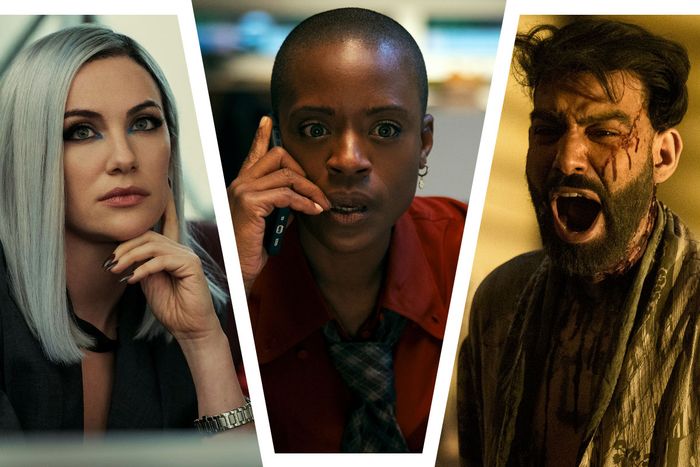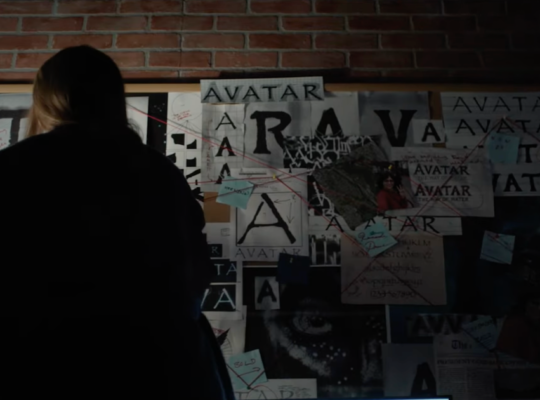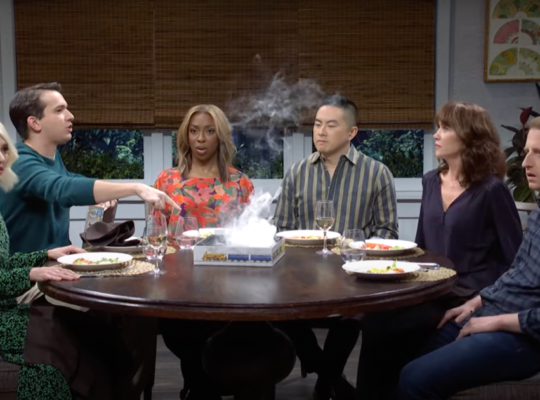[ad_1]

Photo-Illustration: Vulture. Photos: Netflix
With The Fall of the House of Usher, Mike Flanagan is a man unrestrained. The show features all the elements that have come to define his distinct approach to horror cranked up to 11: steely visual palettes, full-circle plotting, an intimate blend of genre thrills and family melodrama, and monologues that gush out of his characters’ mouths like that scene in The Exorcist.
Flanagan also seems mighty angry. Usher is an anti-capitalist revenge fantasy in which members of a Sackler-inspired family are systematically killed off in impressively diverse ways owing to its patriarch’s Faustian bargain with the literal embodiment of Death. Here, the ways the Ushers meet their ends are not unlike a Flanagan monologue: intricate, elaborate, and illustrative of the character experiencing it. Not all deaths are created equal, however. Let us rank the ways. (Needless to say, major spoilers lie ahead.)
10. Roderick Usher (Death by House Collapse)
After being responsible for the deaths of millions and millions, the guy gets off easy. —Nick Quah
9. Madeline Usher (Death by Egyptian Ritual and House Collapse)
Madeline is the queen bitch of the Usher family, a woman whose genius has convinced her that she deserves to be immortal. Remember the plot of that not-good Johnny Depp movie Transcendence? That’s Madeline’s goal for herself: to upload her consciousness into an algorithm so she can live forever digitally. It’s some egotistical rich-person shit, as is Madeline’s obsession with the Egyptian queen Twosret. Lo and behold, the Egyptian artifacts Madeline collects throughout the miniseries come back around in a gruesome way. Madeline’s sense of self-preservation is her downfall — figuratively when she tries to poison brother Frederick and makes an enemy of her strongest ally, and literally when Roderick kills her using the same method, replaces her eyes with sapphires, and pulls out her brain with a traditional hook tool. “You’re a goddess, and you’re gonna live forever,” Roderick promises her, but the Ushers aren’t good at bringing people back to life; they’re good at torturing them. So Madeline staggers around blind in the basement, knocking into stuff for hours, while Roderick gets to tell his side of the story — that’s insult upon injury for this woman who considered herself the mastermind behind everything the siblings accomplished. You know she hates that she died with Frederick instead of fulfilling her wannabe-pharaoh desires. Good riddance! —Roxana Hadadi
8. Napoleon Usher (Death by Fall)
Edgar Allan Poe’s short stories are filled with people driven to madness by guilt, but in this case, Leo’s mania is driven less by guilt and more by trying not to get into trouble with his boyfriend, whose cat Leo found mysteriously shanked to death. But it’s madness all the same, and we spend much of “The Black Cat” watching Xbox Gatsby being tormented by the replacement cat he got at the pound — sold by Verna, natch — which nobody else seems able to see. Dude gets his eyeball scratched! Gnarly. After wrecking the apartment in search of the spectral feline (a reasonable response), Leo spots the thing on the balcony, and his lunge to catch the animal leads him to fall over the railing to his death. A lame way to go, frankly, and points are docked for Verna’s mutilating the boyfriend’s perfectly innocent cat. —NQ
7. Tamerlane Usher (Death by Mirror-Shard Impalement)
This woman is so obsessed with how people perceive her that she can’t actually have sex with her husband, instead hiring sex workers to impersonate her and sleep with him while she watches. Her vanity and her need for control are combined into a toxic stew. Death makes an easy meal of Tammy by increasingly appearing as her double and undermining Tammy’s sense of self. Of course, Roderick’s only born-of-marriage daughter dies in a way that nods to her deep narcissism: impaled by countless glass shards from the mirrors she smashes in a failed attempt to exorcize Death’s reflection. The slow-motion scene of Tammy bouncing on her mattress, skewered with fragments from the mirror hanging above her bed? Satisfying! —RH
6. Victorine LaFourcade (Death by Self-Stabbing)
Victorine’s actual manner of death is kind of a snooze, but it’s the stuff around the killing that makes a wicked impression. In The Fall of the House of Usher’s take on Poe’s classic “The Tell-Tale Heart,” the phantom sound is reimagined as that of Victorine’s bionic device, a light mechanical wheeze that haunts the good doctor, who has already been losing it throughout the episode. Based on the title inspiration alone, we know the ever-present wheeze probably has something to do with Victorine sorta-kinda accidentally bludgeoning her partner, Alessandra Ruiz, to death. The turn arrives when Roderick eventually discovers Dr. Ruiz’s body in Victorine’s apartment. She had carved it open at the chest to implant the device and left it to rot in a room for days on end. Pretty metal. —NQ
5. Eliza Usher (Death by Illness and Buried Alive)
Annabeth Gish has the least screen time of anyone on this list, but man, she makes it worth it. Following in her own Haunting of Hill House footsteps as another tightly wound, religiously faithful matriarch, Gish plays Roderick and Madeline’s mother, Eliza, who is so devoted to her abusive boss, Mr. Longfellow, that she never pushes him to acknowledge her children, the result of their secret affair. Or at least she doesn’t push him when she’s alive. But then she gets very ill, refuses to take any medicine or go to a hospital, and seemingly dies in bed, traumatizing the children. Roderick and Madeline then bury her in the backyard for some more trauma. Then she comes back to life, or maybe was never dead at all, and attacks the kids before eventually strangling Mr. Longfellow and finally dying on top of his corpse. It’s all very dramatic and, thanks to Gish’s wide-eyed, Bible-thumping performance, slightly campy — a pleasant accompaniment to the absurdity of watching this woman get buried alive, crawl out of her coffin, and then go on a violent rampage. Good for her. —RH
4. Frederick Usher (Death by Rube Goldberg Pendulum Axe)
The ponytail alone should be enough to communicate Fred as a pathetic character, but there’s also the whole maiming and torturing of his wife, Morelle, over his torment at almost being cuckolded. His death is consistent with the vibe. Having developed a (thematically appropriate) addiction to a drug that causes paralysis in high doses, he seizes up with his dong let loose while desecrating the abandoned warehouse once operated by the family’s pharma corporation, i.e., the site of his wife’s near infidelity. Mimicking his voice, Verna calls the demolition crew to go ahead with the building’s destruction, and while a simple cave-in would have sufficed, physics and otherworldly forces conspire to create a deadly pendulum over the still-conscious Frederick, who is forced to watch as the makeshift blade slowly descends and severs his body in half. Maximum points for creativity and contrivance. —NQ
3. Lenore Usher (Death by … Death)
Lenore’s death isn’t gory or bloody or gross, but this ranking isn’t just about bloodshed — it’s also about impact, and this killing is the saddest of all. If you know your Poe, the name of Roderick’s compassionate, responsible, principled granddaughter is already a bit of a tell; Poe’s poem “Lenore” is about the tragic passing of an “angel,” a young woman gone too soon. Despite Auggie’s assumption that Lenore is still alive and sending Roderick texts while the Usher patriarch confesses to his children’s deaths, the possibility that the only good member of the family would survive the series is too good to be true. If Death had a heart, killing Lenore just to maintain Roderick’s trade of legacy for success would break it. Because she doesn’t, it breaks ours instead. —RH
2. Camille L’Espanaye (Death by Chimp Attack)
Thank you to Flanagan for the gnarliness of this death, reminiscent of that fantastic scene in Dawn of the Planet of the Apes when experimented-on-by-humans Koba tricks and kills two men who treat him as a circus attraction. Justice comes in many forms! The same goes for the death of Camille, basically the Usher Family consigliere who has secret files on every single person she knows and who loathes her half-sister Vic. Vic is no saint either since she’s rumored to be killing, abusing, and torturing apes in her medical experiments. But Camille isn’t trying to expose Vic because she cares about these animals; she’s doing it for her own gain, which makes her fatally brutal beating by Death in the form of a chimp feel earned. That moment when Verna jumps straight up onto the lab’s surgical table, then stalks across it toward Camille? The gargantuan amounts of blood smeared on the lab’s floor by Camille’s ripped-apart body the next morning? The CGI smile on the chimp’s face when it’s discovered next to Camille’s corpse? It all works to make this demise very nearly the miniseries’ most disturbing. —RH
1. Prospero Usher (Death by Warehouse Acid Rain)
No other death in The Fall of the House of Usher tops the second episode’s set piece: a spectacular shot of nightmare fuel that rockets the body count into the stratosphere. Perry, the youngest and horniest of the Usher clan, moves to burnish his capitalist cred by founding a monetized Eyes Wide Shut–esque sex rave for the debaucherous elite at the previously mentioned abandoned chemical warehouse once operated by the Usher family’s company. But cursed offspring that he is, what was supposed to be a party that climaxes with fire sprinklers dousing everyone with water turns into pure horror as the partygoers are instead showered with acid rain. As the guests are penned in by locked doors, the room swiftly transforms into an H.R. Giger tableau: gooey masses of skin-stripped bodies cover the floor, so juicy you can almost hear the squish. It’s a perverse and beautiful sight made even more unsettling by the sound of Perry’s dying breaths. —NQ
[ad_2]
Source link



 JEWISH DIGITAL TIMES
JEWISH DIGITAL TIMES








